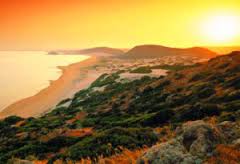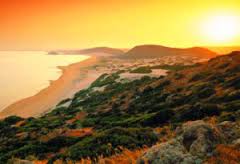
Speech of Neoklis Sylikiotis, Member of the Political Bureau of the C.C of AKEL, at the seminar “The alteration of the demographic character and the environmental downgrading of the Karpasia peninsula – the European dimension”
Saturday 1st June 2013, PEO Conference Hall, Nicosia
Your Excellency Ambassador of the Republic of Cuba,
Your Excellency First Secretary of the Embassy of the BolivarianRepublic of Venezuela in Cyprus,
Dear Kartika Liotard,
Dear friends,

Allow me to welcome you all to the seminar AKEL is organising jointly with the Confederal Group of the European United Left-Nordic Green Left in the European Parliament. We warmly thank the European United Left for its interest. It is a fact that GUE-NGL has always stood by and continues to support Cyprus.
The issue of the alteration of the demographic character and environmental downgrading of the areas in the occupied areas and more specifically of a prominent from an environmental perspective area such as the Karpasia peninsula is a matter of upmost importance for all of us,
I would like to especially welcome our Turkish Cypriot comrades and friends whose presence underlines the special importance our meeting assumes. Today’s event seeks, among other things, to convey the political message that on a number of day-to-day issues, such as a series of environmental problems, the waging of a common struggle of Greek Cypriots and Turkish Cypriots is needed to address them; a common struggle that will prepare the ground so that the two communities can live in peace in a free, reunified and federal Cyprus.
Dear friends,
Even though the issue we are called upon to discuss is known, daily developments, but also the developments in the occupied peninsula of Karpasia do not allow us to ignore it.
The Karpasia peninsula is a source of wealth for all Cypriots, including the lawful inhabitants and owners. It has of historical, cultural and environmental value. Nevertheless, developments in recent years reveal a general attempt to change the peninsula, characterised primarily by its commercialisation and the destruction of the natural environment.
During the past few years, we have witnessed a growth in investments from Turkey in the area threatening the ecosystem. All this is taking place at the same time when the overview of the region conducted by European experts illustrates that it includes 13 different types of natural environment in the proposed conservation area by the EU. A large part of Karpasia forms Special Protection Zones and is included among the regions with the potential of joining the NATURE 2000 network.
More specifically, the Karpasia region is one of the 6 regions in total located in northern Cyprus and due to join the network as a result of a combination of significant categories of natural environment, including rare fauna. It is for this reason that the EU has already provided 5 million Euros for technical guidance for the protection and management of the area within the framework of the aid programme for the Turkish Cypriot community in 2006.
Since 2007 onwards there is a continuous attempt being made by the given Turkish Cypriot leaderships to create the necessary infrastructures so that Karapsia can become a regular tourist zone, thus putting the historical and cultural structure of the Karapsia peninsula in danger.
Foreign capital and investments, especially of Turkish origin, stem from the so-called “Three year protocols” and are directed towards reconstructing the social environment in the occupied areas and hence forcibly altering the natural environment.
Permit me to refer to the relevant provisions of the text of recent protocols. Between 2003-2004, 144 million dollars were invested for the operation of 3,500 hotel beds. In 2008, a new protocol was signed for the completion of the investments in Vokolida and Trikomo, increasing the number of beds to 15,000. Another new plan to construct hostels in the region of Karpasia was submitted.
Lately road works are being carried out to widen the existing road from Rizokarpaso to the area of Apostolos Andreas. As the document of the EU representation in Cyprus notes, “The concerns about the road safety of the road justify a new coating, but any widening or change in the layout of the road may lead to changes with regards the number of visitors in the area, something which on its part can lead to the number of visitors going beyond a sustainable level in such a highly sensitive area such as Karpasia. Furthermore, the EU expressed its concern about the uncontrollable development of the timber estates in the Karpasia Special Environmental Protection Area, something which is not in line with the management plan that was funded by the EU.
Within this irrational and illegal framework of new hotel units and road networks being constructed, the land is being sold off for the operation of branches of TurkishUniversities and Turkish football clubs.
Dear friends,
Just fifteen days ago the European Commissioner for Enlargement and Neighbourhood Policy Stefan Fule sent a letter warning the occupational leader and criticising him for the environmental crimes being committed in the occupied areas, primarily due to a music festival due to take place in the beginning of September and which according to the organisers will attract around 80,000 people on the southern beaches of Karpasia. Without doubt such an event will cause irreparable damage to such a fragile ecosystem. Although the festival will not take place in the area, but in the wider area of Karpasia, we should not be complacent. We must try to transfer the Festival to an area outside Karpasia, given that the whole of the peninsula represents an important monument of nature. We should point out that the transfer of the Festival was achieved chiefly as a result of the activity of Turkish Cypriot organisations.
In addition, the European Commissioner asked Dervis Eroglou to give written explanations about the reasons why the areas that are designated to join the European Network “NATURE 2000” are being destroyed, whilst the EU on its part, meeting its commitment to support the Turkish Cypriot community managed to secure the funds needed. More specifically, Mr. Fule issued a warning that if there is no compliance the financial assistance granted by the European Commission will ne terminated.
At this point, allow me to point out the position of AKEL. Under no circumstances do we wish the termination of the EU´s financial aid to the Turkish Cypriot community. On the contrary, we support this policy on the precondition that the funding will be lawful and bring results. We strongly believe that the funding is necessary so that our common objective is achieved, which is none other than the protection not only of Karpasia, but also of the Pendadaktylos range where illegal logging has already caused damage, but of all the corresponding areas too.
As much, if not more important is another aspect that is inherent in the causes leading to the restructuring taking place in the KarpasiaPeninsula. The fundamental change in the social environment and structures caused by the destruction of the flora and fauna, aims at the same time at the alternation of the demographic character and change in the main ownership model in the area. They are not only inviting foreign capital to buy the land, but are also creating new de facto facts on the ground that are complicating the solution of the Cyprus problem which we are all striving so hard to solve. At the same time, the Turkish Cypriot community, which has become a minority due to the colonisation, is being led as a result of the occupation and Turkish Strategy to extinction.
Dear friends,
Our island’s ecosystem is objectively one and indivisible, but its abnormal separation through force since the summer of 1974 and the continuing occupation creates and exacerbates a number of environmental problems, given that the division of the island does not permit a unified and comprehensive response to them.
It is urgent that we reaffirm the position that the irrational and illegal development in the Karpasia Peninsula undermines the ecosystem and the cultural and historical environment of the area; that this development is changing the demographic structure and raising obstacles to a lasting and viable, just under the circumstances solution of the Cyprus problem. As such, it must be rendered null and void for our own common interest. The need for collective action, together with our Turkish Cypriot compatriots, to address not only environmental, but also socio-economic problems which nowadays are increasing is imperative as never before.
AKEL calls on the EU to exhibit genuine sensitivity concerning the alteration of the demographic situation in the occupied areas. The environmental downgrading and destruction in the peninsula of Karpasia is a tool in the hands of the ruling class in Turkey where the illegal situation is being consolidated through the Islamic big capital.
We are therefore aiming to intensify the struggle of the Greek Cypriot and Turkish Cypriot organisations in the face of this modern open wound. AKEL will be in the front line of this front of struggle, recalling that such problems will only be tackled in a comprehensive way in a reunified Cyprus.




